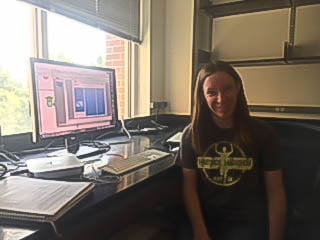Looking for an internship within both of her major fields, biology and health communications, Hastings College junior Emily Grant found the perfect Research Experience for Undergraduates (REU) at the University of Georgia.
For her REU, Grant, a native of Columbus, Nebraska, is spending her summer studying how instructors create opportunities for students to engage in hands-on work during class, and how this aligns with practices in active-learning undergraduate biology classrooms.
Active-learning classrooms are typically technology-rich classrooms that allow students to engage with content on a deeper level. Grant is studying this by looking at recorded biology classes to analyze teaching practices, and is using interview data to look at teacher knowledge.
Working alongside Dr. Tessa Andrews, an education professor at Georgia, Grant is revising an observation tool called the Practical Observation Rubric to Assess Active Learning (PORTAAL).
“The revised version of PORTAAL will allow me to look at two specific elements of an instructors’ teaching practices – opportunities for student practice and logic development,” Grant said. “I will spend the rest of my summer finishing my work with PORTAAL and then tying together the work I have done to analyze the teaching practices in our sample with teacher knowledge. At the end of the summer, I’ll present my work at a poster presentation.”
Grant said she spends about 30-35 hours in her lab each week working on her research project. “When I’m not in the lab, I’m meeting with the Biology Education Research Group (BERG) or my REU group,” Grant said. “At BERG, we look at grant proposals or manuscripts before they are submitted for application. When I meet with my REU group for professional development sessions, we discuss topics that range from classroom observation tools to theoretical frameworks in biology education research.”
From the classroom to the lab
All of the work Grant does this summer can be applied to a communication theory project she will finish this spring at Hastings College. “I am observing communication climate in the lab. It is difficult to be a participant-observer in my lab, but Dr. Kittie Grace has provided a lot of help as I work through the challenges that have been presented by gathering and working through large amounts of data.”
Grace is not the only Hastings College professor who has helped Grant during her REU. A project she worked on with Dr. John Perlich, another communications professor, over the last two years has also provided Grant with a solid foundation during her time at UGA.
“I started working on this project with Dr. Perlich during my freshman year in my Research Methods in Communication course,” Grant said. “Research Methods gave me a great foundation in understanding the quantitative and qualitative paradigms, and has been invaluable for me this summer. I have been able to help others in my REU group understand more about the qualitative paradigm because of what I learned from Dr. Perlich.”
The Hastings College biology department also played a role in helping Grant this summer.
“My freshman year biology course with Dr. Amy Morris was an active-learning classroom, and having real-life experience with what I am studying has been extremely helpful,” Grand said. “It has been so fascinating to make connections to the literature that I have been reading about active-learning in biology to my own experience with active-learning. I struggled at times in my freshman year biology course, but Dr. Morris did not give up on me, even when I did very poorly on the first exam. She took the time to meet individually with students who did not do well on this exam, and this helped me to work through why I had struggled.”
Grant’s experience this summer has affirmed her decision to go into research after graduation.
“Being able to work in a lab experiencing parts of what I hope to do in the future has been awesome,” she said. “I have been able to work very independently, doing a lot of problem solving by myself, but have also learned the importance of asking questions and asking for help when needed. Both of these skills will serve me well in graduate work and beyond.”
By Anna Weber ‘18

